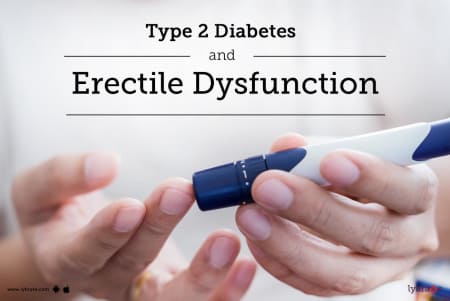Diabetes and erectile dysfunction are two very different illnesses, but one is linked to the other. ED can be termed as the failure to get and sustain an erection in males. It is a condition mainly prevalent in males above the age of 45.
Statistics show that men who have diabetes are at a higher risk of getting erectile dysfunction. They are two to three times likely to get ED. Experts the world over recommend to all men below 45 who have ED to get tested for diabetes.
Diabetes is of two types; 1 and 2. Type 1 diabetes is a chronic condition in which the pancreas is unable to produce insulin and affects around 10% of all people living with diabetes. Type 2 accounts for the remaining 90% of patients with diabetes and is associated with obesity and consistent high blood sugar, which leads to insulin resistance.
Now, to establish the link between diabetes and erectile dysfunction, statistics have shown that roughly about 10% of all men living in Western nations above the age of 40 have a severe ED case. Further, it was discovered that an additional 25% of the population has a moderate case of the condition.
A recent survey by the Boston University Medical Center unearthed a bitter truth – 50% of all men found to suffer from diabetes type 2 will develop a case of ED within 6-10 years after the diagnosis.
Nevertheless, there is a silver lining. Another study revealed that if you have this type of diabetes and start living a healthier life, you will not be doomed to this fate. You stand a chance of regaining your sexual performance. There some alternatives in this field you might want to know how penile implant surgery cost.
The cause of ED in men living with diabetes
The link between diabetes and ED lies in the circulation of blood and the nervous system.
Diabetes causes a lack of control in the blood sugar levels that, in turn, destroys the blood vessels and a considerable part of the nervous system.
When the damage gets to the nervous system’s vessels, it affects the nerves responsible for sexual arousal and reaction.
Thus, the delay in erection or lack of one at all. In many cases, the erection is weak and will not last long enough for sex. Additionally, a firm erection requires good blood flow, and when one is suffering from diabetes, the blood flow is relatively poor.
If left untreated, erectile dysfunction could take a toll on the man. Here are some effects of the condition:
- Low self-esteem
- Depression
- Anxiety attacks
- One may turn to drug abuse
Additionally, here are some risk factors that could potentially lead to getting the disease:
- Obesity
- Unmanaged blood sugar levels
- Smoking
- Excessive alcohol drinking
- Poor diets
- Side effects of prescription drugs for hypertension
However, there are several ways of treating erectile dysfunction. The treatment options are numerous, and I have discussed them below. Take a look:
Sildenafil
Also known as Viagra, sildenafil is an oral medication used to treat patients suffering from ED, see Medzino for more information. It increases nitric oxide effects in your body.
Nitric oxide is a chemical occurring naturally in your body that has a calming effect and allows for muscles of the penis to be relaxed. This drug works for most people, but you will still need stimulation to get an erection.
The medication also has various side effects like nasal congestion, backaches, stomachaches, and occasional visual clarity changes.
Alprostadil urethral suppository
As the name suggests, this is an intraurethral therapy. The procedure includes inserting an alprostadil suppository in the penile urethra. The treatment has promising results, with many patients recording an outstanding 30-60 minutes performance.
After the treatment, the patient gets an erection within 10 minutes of stimulation.
However, there are side effects. They include:
- Slight bleeding in the urethra
- A burning sensation in the penis
Testosterone replacement therapy
Testosterone is a hormone present in males and plays a role in maintaining an erection. Low testosterone levels in the body could also cause erectile dysfunction, and thus intervention is needed.
In such cases, the testosterone could be administered in the form of oral medication, or your doctor could advise a change in your diet. The new diet should contain nutrients that boost your body’s ability to produce more hormones.
Penile implants
Penile implants are the last resort, and practitioners do not recommend it until all other treatment forms fail. The treatment includes surgically inserting devices into both sides of the penis.
The devices help you control how long the erection lasts. They contain malleable and expandable rods.
The two rods have distinct functions. The malleable ones maintain the erection while the expandable ones influence the span of the erection.
As mentioned earlier, this treatment is the last resort, but it has a high chance of success.
Counselling
ED may also be because of certain psychological conditions. Conditions like stress and depression may affect your performance. If you find yourself having a less prevalent erection or none at all, you should seek out medical assistance.
After a few sessions with a psychological counselor, your condition may begin to improve.
Exercise
If your erectile dysfunction is because of diabetes, then attending workout sessions may not be such a bad idea. The sessions will help improve blood circulation, and subsequently, your erection may last longer.
However, before commencing any workout session, you must consult a physician first. They will recommend the best exercises for better results.
Healthier diet
Foods such as whole grain, fish, fruits, and vegetables will go a long way in reducing erectile dysfunction. Persons suffering from ED are also advised to stay away from red meat because it may be counter-productive. Additionally, fewer servings of refined grains will also go a long way.
That is not all; a good diet can also maintain a healthy body weight. Standard body weight is essential in maintaining a good flow of blood into the nervous system.
Good sleeping patterns
Studies have attributed poor sleeping patterns to erectile dysfunction. Further, it was noted that good sleep boosts the production of testosterone. The hormone plays a significant role in maintaining an erection during intercourse.
Therefore, giving yourself 7 to 8 hours of uninterrupted sleep may remedy your condition.
Wrapping up
Erectile dysfunction is not a death sentence. Many men deem themselves unfit for living because of this condition. But ED is treatable and preventable; however, prevention is always better than cure. You should always exercise to give your body a good blood flow and give yourself adequate hours of sleep. Lastly, include a healthy diet in your lifestyle as it could also go a long way.





